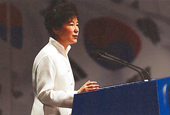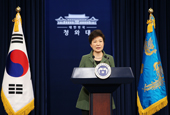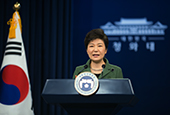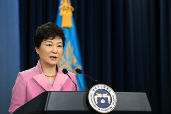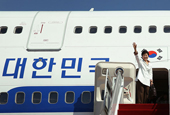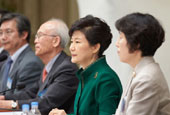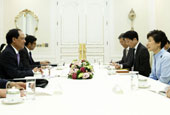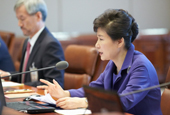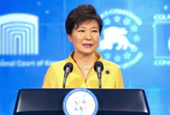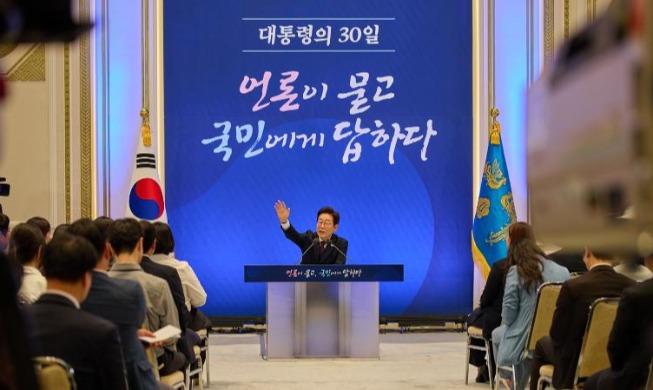The Presidential Committee for Unification Preparation has laid out its post-reunification plans.
At its second round of meetings at Cheong Wa Dae on October 13, the committee unveiled details and schedules across four areas: economics, society & culture, politics & law and diplomacy & security. The plans include the establishment of peaceful reunification charters, building infrastructure, such as renovating 1 million residential units in North Korea over 10 years, and connecting the inter-Korea railroad, including the Pyongyang-Rajin line which will connect to the Trans-Siberian Railway.
"As South and North Korea think over our future, the process of integration is as important as reunification," said President Park Geun-hye, who presided over the meeting. "We need to prepare so that both societies of Korea can live happily without facing disadvantages or discrimination after reunification."
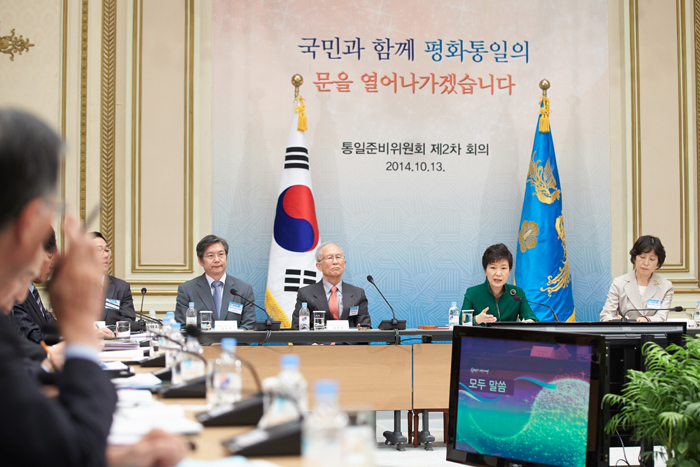
The committee divided the reunification process into three stages: build trust, mature and stabilize. In the trust-building stage, the South will help construct infrastructure in the North. In the mature stage, it will actively engage in economic cooperation. In the third stabilization stage, the two economies of Korea will be combined. The committee also said it needs to prepare for the integration of two national finances and two financial systems, including foreign exchange.
In terms of building infrastructure in the North, the committee said the South would need to initially improve the water supply, kitchens, bathrooms and roofs in two villages as a pilot project. Then, it would renovate 10,000 housing units. As the project reaches its advanced stages, it would cover 1 million homes. The total cost is expected to be about KRW 1 trillion.
As part of President Park's Eurasia Initiative, the Pyongyang-Rajin Line and the Trans-Siberian Railway can be connected by building 72 kilometers of new railroad, according to the committee. It also anticipated that the project would be equivalent to about KRW 1 trillion of infrastructure investment in North Korea and could raise the North's economic growth rate by 2 percentage points. For North Korea's economic development, the committee said the development of natural resource mines in Hamgyeongbuk-do (North Hamgyeong Province) and the joint development of agricultural areas in Russia's Maritime Province are both critically important. Regarding the welfare of the North Koreans themselves, the committee proposed that an integrated medical system be established to provide nutrition and vaccinations and to prevent potential epidemic infections.
Concerning the reunification charters, the committee will make a draft by the end of this year and announce it next year, the 70th anniversary of Korea's independence. The charters will include the current situation and opportunity cost of the division of the Korean Peninsula, the necessity and justifiability of reunification, and related principles, future vision and methods.
To mark next year's 70th anniversary, the committee intends to host a conference on the peaceful reunification of the peninsula and to link the conference to a joint event held by South and North Korea. It suggested that the government invite Nobel Peace Prize laureates and heads of state to the conference and announce a Seoul global peace declaration.
By Limb Jae-un
Korea.net Staff Writer
jun2@korea.kr

At its second round of meetings at Cheong Wa Dae on October 13, the committee unveiled details and schedules across four areas: economics, society & culture, politics & law and diplomacy & security. The plans include the establishment of peaceful reunification charters, building infrastructure, such as renovating 1 million residential units in North Korea over 10 years, and connecting the inter-Korea railroad, including the Pyongyang-Rajin line which will connect to the Trans-Siberian Railway.
"As South and North Korea think over our future, the process of integration is as important as reunification," said President Park Geun-hye, who presided over the meeting. "We need to prepare so that both societies of Korea can live happily without facing disadvantages or discrimination after reunification."

The Presidential Committee for Unification Preparation lays out its post-reunification plans during its second meeting at Cheong Wa Dae on October 13. (photo: Cheong Wa Dae)
The committee divided the reunification process into three stages: build trust, mature and stabilize. In the trust-building stage, the South will help construct infrastructure in the North. In the mature stage, it will actively engage in economic cooperation. In the third stabilization stage, the two economies of Korea will be combined. The committee also said it needs to prepare for the integration of two national finances and two financial systems, including foreign exchange.
In terms of building infrastructure in the North, the committee said the South would need to initially improve the water supply, kitchens, bathrooms and roofs in two villages as a pilot project. Then, it would renovate 10,000 housing units. As the project reaches its advanced stages, it would cover 1 million homes. The total cost is expected to be about KRW 1 trillion.
As part of President Park's Eurasia Initiative, the Pyongyang-Rajin Line and the Trans-Siberian Railway can be connected by building 72 kilometers of new railroad, according to the committee. It also anticipated that the project would be equivalent to about KRW 1 trillion of infrastructure investment in North Korea and could raise the North's economic growth rate by 2 percentage points. For North Korea's economic development, the committee said the development of natural resource mines in Hamgyeongbuk-do (North Hamgyeong Province) and the joint development of agricultural areas in Russia's Maritime Province are both critically important. Regarding the welfare of the North Koreans themselves, the committee proposed that an integrated medical system be established to provide nutrition and vaccinations and to prevent potential epidemic infections.
Concerning the reunification charters, the committee will make a draft by the end of this year and announce it next year, the 70th anniversary of Korea's independence. The charters will include the current situation and opportunity cost of the division of the Korean Peninsula, the necessity and justifiability of reunification, and related principles, future vision and methods.
To mark next year's 70th anniversary, the committee intends to host a conference on the peaceful reunification of the peninsula and to link the conference to a joint event held by South and North Korea. It suggested that the government invite Nobel Peace Prize laureates and heads of state to the conference and announce a Seoul global peace declaration.
By Limb Jae-un
Korea.net Staff Writer
jun2@korea.kr
Related Contents
Most popular
- Grammy-winning producer calls Suga of BTS 'amazing artist'
- Animated 'KPop Demon Hunters' tops Netflix charts in 41 markets
- 'Squid Game' events to pump up K-Content Seoul Travel Week
- Reunited BLACKPINK releases video preview of world tour
- 'Universal love, family' themes fuel success of 'King of Kings': director
